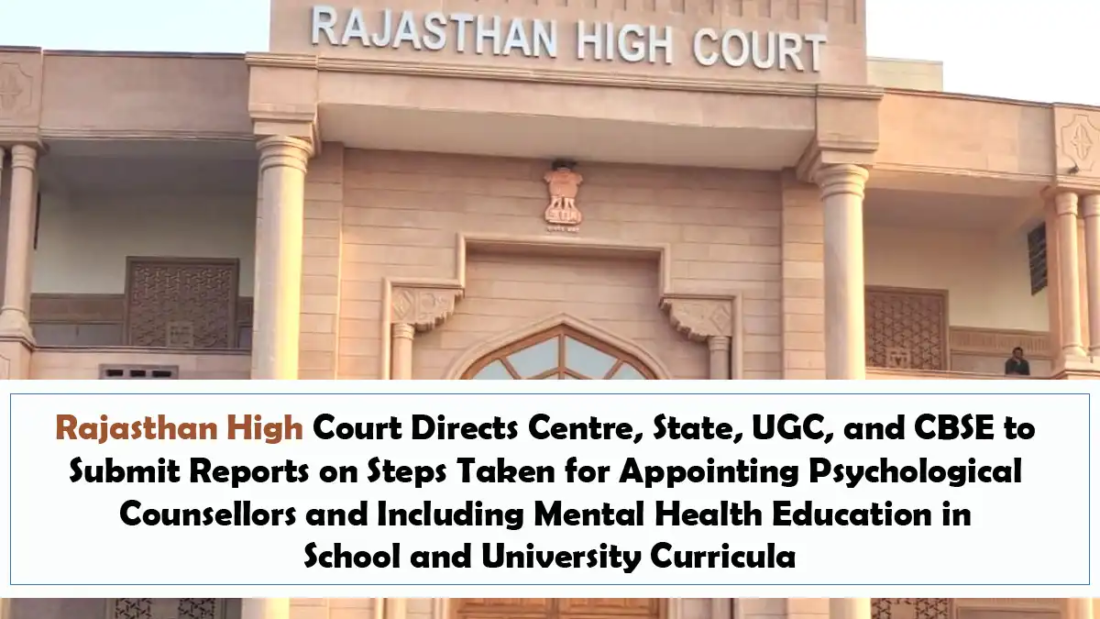Facts of the Case
The case arose from a public interest litigation (PIL) filed before the Rajasthan High Court drawing attention to the alarming rise in student suicides in India, particularly among students aged between 10 and 30 years. The petitioner expressed grave concern that despite growing mental health challenges faced by young students, educational institutions lacked adequate psychological support systems. It was submitted that neither schools nor higher education institutions had provisions for psychological counsellors or mental health centres, leading to a gap in emotional support and early intervention.
The Division Bench comprising Acting Chief Justice Sanjeev Prakash Sharma and Justice Sanjeet Purohit took cognizance of the matter on 19 September 2025, observing that psychological wellbeing was a crucial component of education that needed urgent systemic attention. The Court noted that the petition also raised the issue of incorporating “Psychological Maintenance and Mental Health” as part of the academic curriculum at all levels of education to ensure awareness, destigmatisation, and prevention of mental health crises among students.
Contentions of the Petitioner
The petitioner contended that there was an alarming increase in suicide cases among students due to academic stress, social pressure, and lack of accessible mental health support. It was argued that the education system had failed to integrate psychological counselling services, despite multiple recommendations from health and education commissions and global standards under UNESCO and WHO frameworks.
It was further submitted that psychological education and counsellor availability were not mere welfare measures but essential to ensuring the right to life with dignity under Article 21 of the Constitution. The petitioner urged the Court to direct the Centre, State Government, University Grants Commission (UGC), and Central Board of Secondary Education (CBSE) to formulate clear policies and implement systems to address mental health issues among students. The plea also sought that “Psychological Maintenance and Mental Health” be incorporated into school and university curricula as a compulsory subject to promote awareness and preventive care.
Contentions of the Respondents
Upon issuing notice, the Union of India was represented by Mr. R.D. Rastogi, Additional Solicitor General, while Mr. S.S. Naruka, Additional Advocate General appeared for the State of Rajasthan. The UGC was represented by Dr. Abhinav Sharma, and the CBSE by Mr. M.S. Raghav.
Although formal replies were yet to be filed, the respondents accepted notice and sought time to present their responses and suggestions. The respondents indicated that steps were being considered in line with the National Education Policy (NEP) 2020, which emphasises holistic student development and mental health awareness. However, the Court observed that concrete measures and timelines were yet to be articulated and thus required detailed affidavits and reports from each respondent body.
Court’s Observations
The Bench underscored the urgent need for institutional accountability in addressing mental health issues among students. Emphasising the constitutional dimension of the issue, the Court noted that the right to education must encompass not just academic instruction but also emotional and psychological wellbeing.
The Division Bench recorded in its order: “Learned counsel for the respondents will be expected to file their suggestions and the steps which have been taken for providing psychological counsellors and also inform about the present steps being taken to incorporate subject of Psychological Maintenance and Mental Health in the subject curriculum at all levels.”
The Court thus recognised that mental health education was not an ancillary concern but an integral part of the educational system. It further indicated that both preventive and responsive measures, such as counselling facilities, awareness programs, and curriculum integration, must be considered by educational authorities at the central and state levels.
The Bench observed that in light of increasing suicide trends among students, the education system must take proactive and structured steps to ensure early psychological intervention and promote mental resilience through formal education and institutional support.
Court’s Order
After hearing the matter, the Division Bench issued notices to all respondents, the Union of India, State of Rajasthan, University Grants Commission (UGC), and the Central Board of Secondary Education (CBSE), directing them to file detailed affidavits outlining:
- The steps already taken for appointing psychological counsellors and establishing mental health support systems in educational institutions.
- Measures undertaken or proposed to incorporate “Psychological Maintenance and Mental Health” as a part of the curriculum at school, college, and university levels.
The order, dated 19 September 2025, directed, “Let a copy be provided to the respective counsels appearing for the Union of India, for the State Department as well as for the University Grants Commission (UGC) and as well as to the counsel appearing for the Central Board of Secondary Education.”
The Court further mandated that the respondents file their suggestions and progress reports within eight weeks, after which the matter would be listed for further hearing. The Bench thus signalled a strong judicial impetus towards embedding mental health awareness and counselling services as an integral component of the Indian education system.
Written by Adv. Deeksha Rai
 Cart is empty
Cart is empty 


